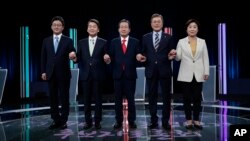South Korea will elect a new president Tuesday (May 9) following a year of political upheaval in which scandal, protests and impeachment have the public demanding transparency and change.
Liberal Democratic Party of Korea candidate Moon Jae-in, who was leading in the last public opinion polls with an approval rating over 40 percent, made a final pitch to voters Monday.
“Without the united power of our people, [the new administration] will struggle from its first step. We must overcome this crisis with united power,” said Moon.
His closest rivals; conservative Liberty Korea Party candidate Hong Joon-pyo and the People’s Party candidate Ahn Cheol-soo, who is also a liberal, were both close to 20 percent in the polls while the other candidates running registered only in the single digits.
Hong made a final plea to voters Monday to unite around him to protect conservative free market and strong on defense policies that have been in place for the last eight years.
“I stood up to prevent the left-wing from seizing power, and acted to protect a free Republic of Korea. We will win. Truth will beat lies. Our people will win. Justice will beat hypocrisy. The Republic of Korea will win,” said the Liberty Korea Party candidate.
Scandal driven
The early presidential election was brought on by the impeachment of conservative then-President Park Guen-hye last December for allegedly colluding with her influential friend, Choi Soon-sil, to force Korean conglomerates to donate nearly $65 million to two dubious foundations as well as funneling funds and side contracts to companies owned by Choi and her friends.
For weeks prior to the impeachment vote in the National Assembly, massive peaceful protests, dubbed the Candlelight Revolution, were held across the country to demand Park’s ouster and for reforms to the political system in which powerful conglomerates have undue influence over elected leaders.
After being forced from office, Park was arrested and is being prosecuted for bribery and other charges connected to the scandal. Samsung Group vice chairman Lee Jae-yong and Lotte Group chairman Shin Dong Bin have also been indicted on related graft and collusion charges.
Economic reform
Moon, who is a human rights lawyer, has promised to end the common practice by South Korean leaders to pardon convicted corporate criminals. The Democratic Party candidate has also said he will break up the often opaque ties between big business and the government in the world's 11th largest economy, and wants to increase public sector jobs and raise taxes on the wealthy.
His leading liberal rival, Ahn, who is a computer software entrepreneur, has said he would empower the Fair Trade Commission (FTC) to crack down on corporate abuse. But he has also said the government should not be heavy-handed in intervening in the private sector and instead focus on making the markets fair and friendlier for innovation.
Hong has said “an anti-business mindset does not help boost the economy.” While he would punish corporate wrongdoings like tax evasion, Hong does not support hampering businesses with unnecessary regulations that would restrict job creation.
North Korea
This election could also be a referendum on North Korea policy.
The conservatives want to maintain Park’s strong support for the U.S. alliance and for hardline polices that rely only on strong sanctions and military deterrence to pressure the Kim Jong Un government to dismantle its nuclear arsenal in return for economic relief and security guarantees.
The two leading liberal candidates want to temper sanctions with dialogue. Moon has also he said would pursue engagement policies such as reopening the jointly run Kaesong Industrial Complex in North Korea, which was closed following Pyongyang’s fourth nuclear test last year.
The North Korean ruling party newspaper, Rodong Sinmun, endorsed the more liberal approach, saying in a column Monday, “inter-Korean confrontation, led by the [South Korean] conservatives, should be put to an end, and a new era of unification should open up in collaboration between our race.”
Conservatives maintain that attempts to assist and engage North Korea by past liberal administrations failed to convince Pyongyang to give up its nuclear program.
U.S. President Donald Trump’s recent criticisms about South Korea, demanding $1 billion for the THAAD missile defense system being deployed on the Korean Peninsula, and calling the U.S.-South Korea free trade agreement a “horrible” deal that needs to be renegotiated, could also depress the conservative vote while energizing liberals who want the next South Korean president to stand up to American pressure.
Moon has said, however, the U.S.-South Korea alliance is essential for the country’s national security, and he believes Trump also ultimately wants a negotiated settlement.
Youmi Kim contributed to this report.







